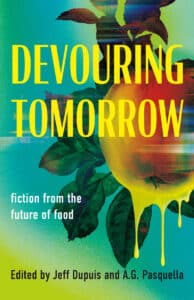Devouring Tomorrow: Fiction From the Future of Food, edited by Jeff Dupuis & A.G. Pasquella. Rare Machines (Dundurn Press), 2025.

This anthology serves up a tasty buffet of 16 imaginative short tales from Canadian science-fiction writers in response to the question: How will food change, and how will it change us? The editors have challenged the contributors to envision how the future of food might be impacted by “the world’s current trajectory of climate change denial, unmitigated consumption, and greed”. Below are some of the speculations in this volume.
When agriculture is threatened by the disappearance of the bee population, in Pollinators by Carleigh Baker, scientists try to train moths to take over the task. But moths are less beneficial in Terri Favro’s Rubber Road, an apocalyptic story about a murderous onslaught of the insects that forces two sisters to flee, subsisting on plundered junk food and chewing gum.
When most of the world is destroyed by hydrogen bombs, in Time to Fly by Lisa de Nikolits, rich folks become survivalists on a luxury cruise ship, repurposing the vessel as a “sustainable floating ecosystem”.
When a future Planet Earth dehydrates, in A View Worth All the Aqua in the World by Anuja Varghese, water replaces money as the common currency. Precious Aqua credits are traded for a Virtual Nutrition experience of consuming legacy food delicacies in a rooftop restaurant. A.G.A. Wilmot mines a similar vein in Just a Taste, a yarn about a memory thief in a high-tech future who seeks out the long-forgotten flavour of a burger from the brains of ancestors. An even more far-out variation on this mind-harvesting theme, Unlimited Dream by Mark Sampson, describes an invention whereby “conjured dreams” can produce huge quantities of delicious food for the starving masses of the Global South.
When food is the centrepiece, a social event may invoke elaborate protocols. In You Need a Licence for That by Sifton Tracey Anipare, a guest at a house party for pregnant women is ostracized, not only for her lack of a baby bump but for the non-PC potluck plate she has brought. Novel Suggestions for Social Occasions by Ji Hong Sayo describes an engagement dinner party in a neo-medieval future. On the menu are body parts of defeated enemies, and the meal devolves into a life-and-death clash between the hosts and their guests.
Some of the stories in Devouring Tomorrow feature Frankenfoods. Catherine Bush’s Pleased To Meet You contemplates artificially-created foods becoming sentient. Creepy stuff! Elan Mastai’s Succulent offers the notion of Hollywood celebrities marketing their DNA in the branding of lab-grown meat. Would you care to order some Roast Brad Pitt or Kung Pao Cate Blanchett?
My favourite entry in the anthology is Lorenzo and the Last Fig by Eddy Boudel Tan. The backdrop is drought, wildfire smoke and a fruit-killing fungus in the year 2049. The locale is an island in the Salish Sea, where a little piece of Italy has been transplanted by climate refugees.
At the other end of Canada, Food Fight by Chris Benjamin chronicles the struggle of a quirky family of organic farmers in PEI to fend off a corporate behemoth. The story feels underdeveloped, but it contains the seeds of a juicy satire.
This collection is like the proverbial curate’s egg: parts of it are excellent, others not so much. (I found the last two pieces in the book inedible). Depending on your taste for science fiction, these stories may amuse, enlighten or disgust you. In some cases the connection with food is tangential, although the spectre of nutritional scarcity pervades many of these narratives. As revealed in the bios on the back pages of Devouring Tomorrow, the authors comprise a prolific group of Canadian inventives, whose other works you may be tempted to sample after nibbling these tidbits.
Photo Credits:
Feature image: Food buffet, Adobe Stock

Ross Thrasher enjoyed a career as a librarian at post-secondary institutions in the U.S., the South Pacific and Canada where he led the Mount Royal College library’s transition to university status. Ross is interested in literature, travel and the performing arts.


